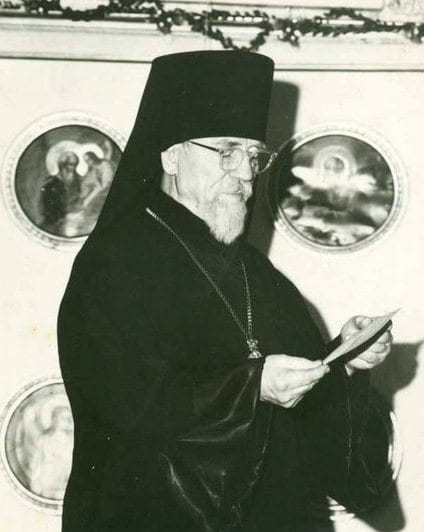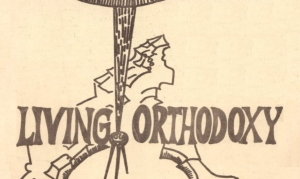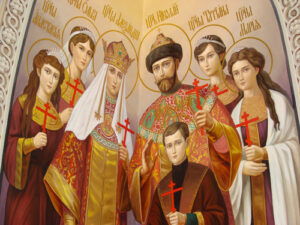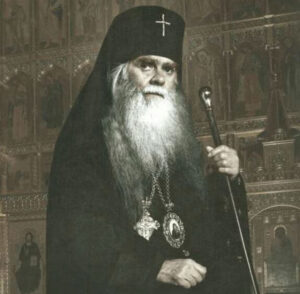Are There any such Souls Today? What Archbishop Amvrossy (Merezhko) Understood and Repented of. Declaration of His Eminence Archbishop Amvrossy

First, a Historical Note on Archbishop Amvrossy (Merezhko) formerly of Pittsburgh and West Virginia source: ROCOR Studies
Archbishop Amvrossy (Adrian Merezhko, 25 Aug 1889-26 Nov/9 Dec 1974) was born near Kiev in 1889. He grew up in the Kiev Caves Lavra. After graduation from secondary school, he worked as a secretary in the Ekaterinoslav provincial administration. He emigrated to the USA in 1923. In the USA, he became acquainted with Archbishop Vitaly (Vassily Ivanovich Maximenko, 8/20 Aug 1873-8/21 Mar 1960) who influenced him greatly as a mentor, and imparted a theological education to him. He was ordained to the diaconate by Vladika Vitaly in 1938, and served at Vladika Vitaly’s Cathedral of the Ascension in the Bronx (New York). He was ordained to the priesthood, also in 1938, by Metropolitan Theophilus (Feodor Nikolaevich Pashkovsky, 6 Feb 1874-14/27 Jun 1950), who at that time headed the North American Metropolitan District of the Russian Church Abroad. In 1939, Father Adrian was assigned as rector of the parish of Saint Spiridon in Perth Amboy, New Jersey.
In 1946, he followed Metropolitan Theophilus into schism from the Russian Church Abroad. This schism was the result of the Metropolia’s infamous 1946 “Cleveland Council,” which has been described as an “uncanonical domination by laity over the clergy and bishops.” (1) The 1946 “Cleveland Council” resulted in the North American Metropolia’s embarking on an “independent” course; from 1946 until the North American Metropolia received Autocephaly from the Moscow Patriarchate in 1970, the Metropolia was “on its own,” recognizing no superiors, and its “independent” status not being recognized by any of the other Orthodox Churches. In 1955, Father Adrian was consecrated to the Episcopate of the North American Metropolia as Bishop of Sitka and Alaska. While serving as Bishop of Alaska, he was sent for seven months to Tokyo to oversee the Orthodox Church of Japan. In 1967, he was appointed as Archbishop of Pittsburgh and West Virginia, which was, at that time, the largest Diocese of the Metropolia.
Archbishop Amvrossy was deeply disillusioned by the results of the Autocephaly granted to the North American Metropolia by the Moscow Patriarchate in 1970. He was also disturbed by trends he recognized in the life of the newly created Orthodox Church in America:
“Orthodox Christian life is based upon man’s ability to cope with his passivity and the influences of a world of evil and temptation. Modernism, to the contrary, is based upon a lowering of spiritual standards in the name of accommodation to this world. Of late, in the Metropolia, there has been a particularly intensive attack upon the use of the Church Slavonic language during services; the shortening and diminution of these services; the introduction of the Gregorian calendar into church life; the granting of mass confessions; and the giving of communion without confession. When I spoke of these things at the last Council of Bishops meeting that I attended [that is, in the OCA], my observations brought forth such a violent reaction that it became clear that I could no longer endure and be responsible new direction in church life. For these reasons, I was compelled to beseech His Eminence Metropolitan Philaret [Georgy Nikolaevich Voznesensky, 22 Mar 1903-8/21 Nov 1985] that he accept me as a member of the hierarchy of the Russian Orthodox Church Outside of Russia, the true witness of the legacy of the martyred Patriarch Tikhon.” (2) Archbishop Amvrossy was received into the Russian Church Abroad in 1972, and served at the Synodal Cathedral in New York City, as well as various other parishes in the USA. In 1973, Vladika Amvrossy went to live at the Holy Transfiguration Monastery in Boston, Massachusetts, which then was under the jurisiction of the Russian Church Abroad. Vladika Amvrossy reposed there in 1974, and was buried at the monastic cemetery at Holy Trinity Monastery in Jordanville, New York. May his memory be eternal!
Sources:
1. Dimitry Pospielovsky, The Russian Church Under the Soviet Regime, 1917-1982 (Saint Vladimir’s Seminary Press Crestwood, N.Y. 1984), 297
2. “Declaration of His Eminence Amvrossy, formerly of Pittsburgh and West Virginia” The True Vine Volume 1.1 (May, 1972); Father Georg Seide, Geshichte der Russischen Orthodoxen Kirche im Ausland von der Grundung bis in die Gegenwart (Otto Harassowitz Wiesbaden, Germany 1983); Orthodox America, 1794-1976 Constance J, Tarasar, ed., (The Orthodox Church in America Department of History and Archives Syosset, New York 1976).
Declaration of His Eminence Archbishop Amvrossy
formerly of Pittsburgh and West Virginia
“Duty requires that I address this word to the Russian Orthodox clergy and laity of North America. It is likely that many have surmised the reasons which compelled me to renounce my membership in the Episcopacy of the Orthodox Church of America (Metropolia) and my subsequent request that I be accepted in the ranks of the Hierarchy of The Russian Orthodox Church Outside of Russia.
“I arrived in America in 1923 from Russia, seized by godless power, after a bloody civil war, in which I took part with the White Army in the South of Russia. I have lived in America for fifty years, became an American citizen, and have grown to love this great Land.
“From the date of my arrival here, I have dedicated myself to the service of God, first as a deacon to Archbishop Vitaly of blessed memory in his Cathedral in the Bronx, New York, and later as a priest, ordained and assigned by the late Metropolitan Theophilos during those blessed days of peace and growth when the North American Metropolitan District was a part of the Russian Orthodox Church Outside of Russia.
“Within three years of my wife’s death in 1950, I took monastic vows and, in 1955, was consecrated as a bishop and assigned to head the Alaskan Diocese of the Metropolia. After 15 years of service there, I was sent to Japan, where I remained for seven months, retaining my designation as Head of the Alaskan Diocese. In 1967, I became Ruling Archbishop of the Pittsburgh and West Virginia Diocese, the largest diocese in the Metropolia.
“During the fifty years of my life and service in America, I became acquainted with and grew to love many of the clergy and faithful who were able to preserve the priceless heritage of the Russian Orthodox Church with its magnificent traditions and holy rituals. Because of this affection to so many good people, of late I accepted much, which under different circumstances I would not otherwise have tolerated.
“But alas, two years ago, the leadership of the American Metropolia, in haste and intemperance, entered into agreement with the Moscow Patriarchate through its representative, Metropolitan Nikodim — concerning the granting of autocephaly to the former.
“We were tempted by the promise of complete freedom from Moscow and a union of all Orthodox Churches in America into one independent Church. With trepidations in my heart, I participated in these arrangements, not wishing to induce internal dissentions within the ranks of the Metropolia which could have been exploited to the detriment of the Church by her enemies. One hoped that all would end well. Unfortunately, to the contrary, all which we were cautioned against has come to pass. Receiving autocephaly from Moscow has created new ties between the Metropolia and Moscow with the result that Moscow’s influence has deepened in Church-life here.
“Not one other Church, free from the domination of Moscow, has recognized this “autocephaly” and, contrary to all our expectations, the Moscow Patriarchate has strengthened its power here through their 45 parishes in America, although, according to our original understandings these parishes were to be released to the Metropolia. Again, in violation of all understandings and agreements, Moscow has assigned a new bishop to this country — Makary of Uman. Trips to Moscow, endless concelebrations, exchanges of gifts, all against the wishes of many of the bishops and clergy of the Metropolia, gradually led to a rapprochement with those Moscow hierarchs who we all know are subordinated to the enemies of the Church.
“All of this has called forth great grief in me. With each passing day, I saw more clearly my duty before God and man. To these events has been added yet another grave danger — the philosophy of “modernism”, which has relentlessly been introduced into parish-life here.
“Orthodox Christian life is based upon man’s ability to cope with his passivity and the influences of a world of evil and temptation. Modernism, to the contrary, is based upon a lowering of spiritual standards in the name of accommodation to this world. Of late, in the Metropolia, there has been a particularly intensive attack upon the use of the Church Slavonic language during services; the shortening and diminution of many of these services, the introduction of the Gregorian Calendar into Church life, the granting of mass confessions, and the giving of Communion without Confession.
“When I spoke of these things at the last Council of Bishops’ meeting that I attended, my observations brought forth such a violent reaction that it became clear that I could no longer endure and be responsible for this new direction in Church life. or these reasons, I was compelled to beseech His Eminence Metropolitan Philaret that he accept me as a member of the Hierarchy of the Russian Orthodox Church Outside of Russia, the true witness of the legacy of the martyred Patriarch Tikhon.
“My decision has brought me no material gains; on the contrary – I shall lose. Of course, this is not important when one realizes that I am again privileged to serve that Church which is the keeper of Orthodox purity and holy Russian Church order. I am eternally grateful to His Eminence Metropolitan Philaret and the Members of the Synod of Bishops for the love and understanding with which I was met.
I have written these lines in fulfillment of my priestly duty before God, my flock, this great country and all the good it has brought me and before all-suffering Russia, where I received the great gift of life and the Holy Orthodox Church.”
† Archbishop Amvrossy
29 February/ 13 March 1972
New York, New York
Source: Orthodox Life Magazine, 1972 Vol 2, Jordanville, New York, USA




